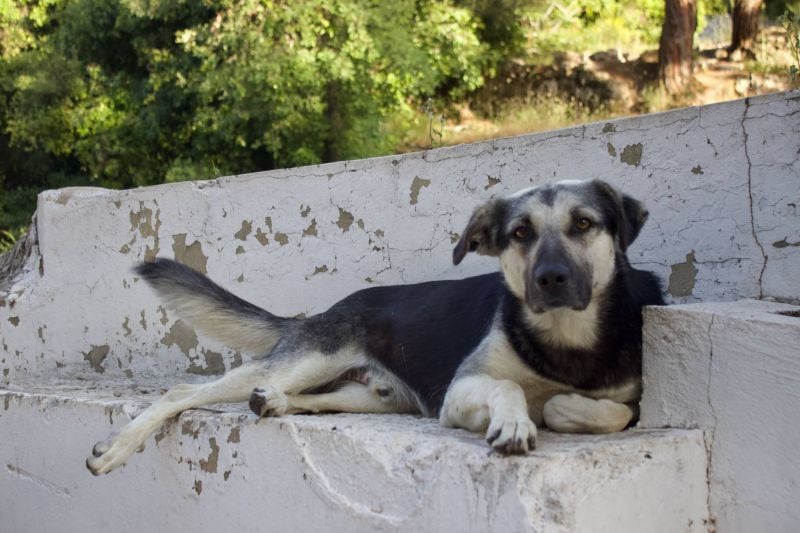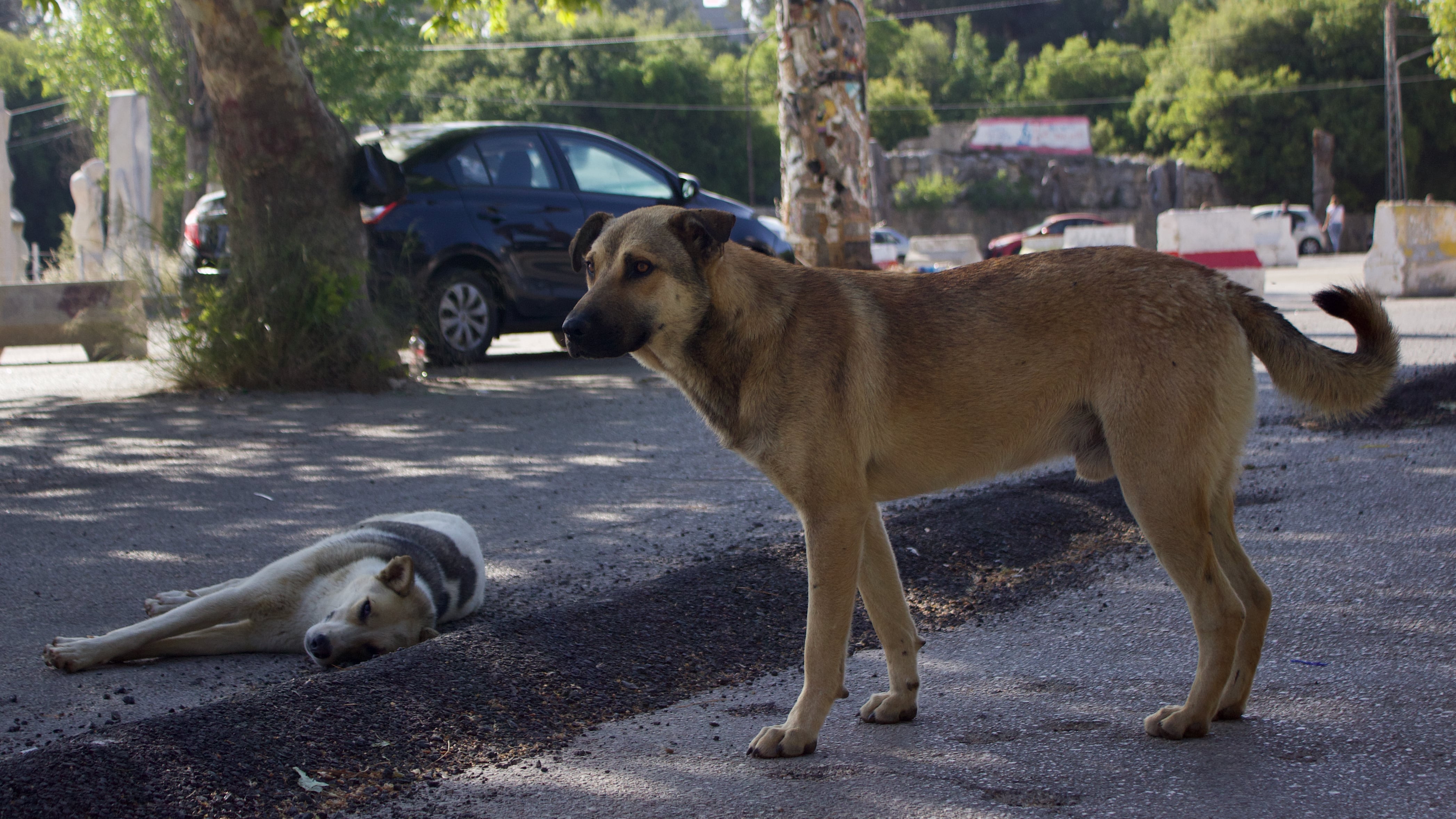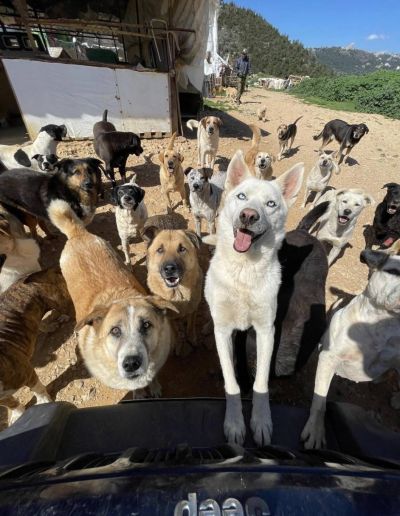
A dog in Aley's Ras al-Jabal neighborhood, where residents say someone laid out chicken bones laced with Lannate poison. May 25, 2023. (Credit: Richard Salame/L'Orient Today)
ALEY, Lebanon — On a Tuesday night in late May, residents of Aley found a disturbing sight: several dogs dead and dying from apparent poisoning.
The residents found stashes of poisoned chicken bones deliberately placed in locations where locals distribute food to the city’s stray dogs. To date, residents don’t know who laid the poison.
Mirvat al-Dibs worked as a public school teacher up until her retirement earlier this year. For the past seven years, she has been tending to the area’s stray dog population by distributing food and water and taking the dogs to the vet to be vaccinated and neutered — all at her own expense.
She says at least three dogs died last month in two mass poisonings in the area just three days apart. Thirty other dogs survived only because she administered atropine injections in time to counteract the effects of the poison.
“I saw the chicken on the ground and I saw the dogs moving strangely, some of them were shaking, some were frothing at the mouth, some had snot leaking out of their noses,” she recalls. “I immediately called the vet and sent him photos. He told me to find them injections as quickly as possible.”
Dibs credits the limited success of the would-be massacre to the fact that she and other community members keep the local dogs well-fed, reducing their appetite for the poisoned chicken they might otherwise have feasted on.
 Queenie, the pet of Aley resident and lawyer Nadine Kheshen, was poisoned to death by unknown persons in May 2023. (Courtesy of: Nadine Kheshen)
Queenie, the pet of Aley resident and lawyer Nadine Kheshen, was poisoned to death by unknown persons in May 2023. (Courtesy of: Nadine Kheshen)
A painful death
One of the dogs that was killed was named Queenie. Queenie was the pet of Aley resident Nadine Kheshen, who practices international law.
Samer Bou Hassoun, who works as a natour (doorman) in Kheshen’s building, says he found Queenie dead and poison dumped near the building’s entrance. At the end of the street, another dog lay dying in agony.
Kheshen filed a complaint on June 6 against unnamed defendants with the public prosecutor in Mount Lebanon, in order to compel authorities to investigate the incident.
In her complaint, seen by L’Orient Today, she alleges that “an unknown person threw bones mixed with Lannate on the street” outside her house, leading to her dog’s death. The use of the toxic insecticide Lannate (Methomyl) was confirmed by a veterinary lab test performed on Queenie after her death.
Her complaint cites Article 742 of the Penal Code, which makes the intentional poisoning of an animal belonging to someone else punishable by a prison sentence of three months to two years. The complaint also argues that indiscriminately spreading poison around endangers human life, particularly that of children.
Prior to the poisoning, Kheshen had four dogs she fed and cared for, including Queenie who would sleep outside her building. “They all feel like my babies and to have this one — she was the one that had been with us the longest — killed, was very, very emotional,” she says.
Lannate poisoning, along with shooting, beating, burning and other methods of killing dogs, is a widespread problem in Lebanon. Multiple instances of animal cruelty against dogs have been documented in just the past month, for instance.
Poisonings, in particular, happen “in many regions in Lebanon,” says Jason Mier, executive director of Animals Lebanon, and are not always the work of rogue individuals.
 Two stray dogs in Aley's Ras al-Jabal neighborhood, where residents say someone laid out chicken bones laced with Lannate poison. May 25, 2023. (Credit: Richard Salame/L'Orient Today)
Two stray dogs in Aley's Ras al-Jabal neighborhood, where residents say someone laid out chicken bones laced with Lannate poison. May 25, 2023. (Credit: Richard Salame/L'Orient Today)
“Previously there were specific orders [to poison dogs] from municipalities,” says Mier. “In [recent] years we don’t see those orders anymore. You might see, at most, a vague order from a municipality citing the need to ‘deal’ with homeless animals but nothing about actually poisoning them ... Certainly, to poison an animal is completely illegal and the welfare and management of homeless animals is the legal responsibility of the municipality.”
Despite this obligation, a video circulating online in December 2017 appeared to show employees of the Ghobeiri municipality poisoning stray dogs in the Beirut suburb, even drawing a rebuke from then-President Michel Aoun. The municipality suspended employees over the incident but denied responsibility.
More recently, in 2021, the bodies of five dogs were discovered on the Lebanese University’s Hadath campus, sparking outrage among students who had cared for the animals. Another dog was found on the campus at the time, suffering from symptoms of Lannate poisoning. University leaders subsequently released a statement expressing regret for “the way in which the issue of stray dogs was addressed on and around the campus.”
The mayor of Aley did not respond to a request for comment on the late May poisonings in the city and the municipality’s strategy for stray animals.
Illegal acts
In 2017, Lebanon passed an animal protection and welfare law which states that animals may be euthanized “only under the supervision of a veterinary doctor” and using methods in accordance with the regulations of the World Organization for Animal Health (referred to by its former acronym: OIE).
The organization considers the use of “pesticides and herbicides” for euthanasia “unacceptable … on animal welfare grounds.”
The Lebanese law also prohibits “any act that may inflict distress, pain or suffering to animals.”
Under the law, stray animal populations are the responsibility of municipalities, which are required to create management plans for their stray populations. The Agriculture Ministry has yet to set forth its guidelines for stray population management, however, as required by the 2017 law.
Mier says Animals Lebanon was working with the ministry on drafting these and other decrees to further define and implement the law, but the collapse of the state over the past four years put that work on hold.
He argues that the lack of a decree does not mean municipalities are off the hook from their responsibilities to manage stray populations.
“Because the law is in accordance with international conventions, one of which is the OIE, that does give the guidelines for stray dog population management.”
“Yes, it is frustrating to us; of the things that have happened in the government in the last years, that we are not able yet to get all these decrees and decisions finalized and legally in force yet, but that doesn’t prevent all the other aspects of the law from being applicable,” he says.
Dibs and Bou Hassoun say the poisonings last month in Aley’s leafy Ras al-Jabal neighborhood are the first to take place in the area as far as they know. Previously, the Aley area of Kettaneh saw repeated poisonings, Dibs says.
Stray population on the rise
In Ras al-Jabal, hostility towards animals had been on the rise since the onset of COVID-19 and the economic crisis.
“There used to be five to 10 dogs in the area,” Dibs says, “but since COVID and the economic crisis, people started abandoning their dogs.” Kheshen adds that people from other areas come to Ras al-Jabal to dump their pets knowing that some locals are providing food.
The increase in the dog population led to an uptick in complaints from neighbors and visitors to the area who come to walk their dogs on the relatively calm streets or visit the neighborhood’s amusement park.
“People come here to walk their dogs and they [and the strays] bark at each other, so some people get upset and scared for their dogs,” Bou Hassoun says. “There are a lot of people who are not happy with [the strays’] presence and throw rocks at them.”
Some of the anger has been directed at people like Dibs, who feed the dogs. She says some people have called her “stupid” for doing so, but she sees it differently:
“I feed them, give them water. What does a dog need besides to be full and to drink? So then they don’t bother anyone,” Dibs says. “These dogs don’t do anything.”
With anger at dogs showing no signs of tapering, and no one held accountable for the poisonings, both Dibs and Bou Hassoun say they fear slayings will be attempted again.
Dibs says the first step to a better solution for everyone — dogs and humans — in Aley is to have cooperation with the municipality over management of the strays.
For instance, she says the municipality could set aside a piece of land on which to shelter the dogs. But Kheshen says that up until now, they have not received help from local authorities.
“Poisoning doesn’t work,” says Mier. “I think that is evidenced by the fact that that has been the primary way for municipalities to deal with this issue for decades. So, if it worked, we would have solved the problem by now. Poisoning only causes a lot of suffering and ignores all the other issues of why those dogs are showing up.”



